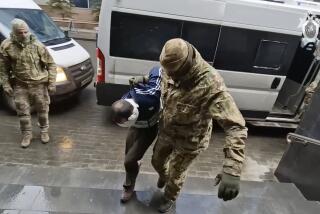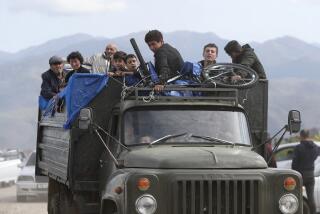Wind of Islam Fans Politics in Emergent Tajikistan
- Share via
DUSHANBE, Tajikistan — An hour before dawn, the wail of a Muslim call to prayer rouses the faithful out of their sleep in the makeshift tent city where thousands of protesters have camped out for most of the last two months. Many have come here from distant rural settlements to speak out against the Communist-led government in this small former Soviet republic bordering Afghanistan.
At major intersections here in the capital, small groups of young guards with guns and sticks in hand and wearing green medallions with the name “Allah” hear the call to prayer and await to be relieved from their watch.
After the prayers, youths in combat fatigues and bearded village patriarchs wearing traditional long, quilted robes and pointed black boots again fill the plaza in front of the presidential palace.
United in a coalition of religious, nationalist and democratic parties, this ragged army--the opposition’s foot soldiers--responds most readily to the idiom of Islam.
On Wednesday, a few days after opposition leaders won power-sharing concessions from the government, Tajikistan’s top Muslim cleric, Qasi Akbar Turadzhonzoda, asked the people to clear the square. You can go home, he said, knowing that your views will be represented in government.
As the opposition celebrates its victory, a natural question arises for Russia and the West: Will Tajikistan follow in the footsteps of Iran? The answer from Turadzhonzoda is a flat no.
“We want to rebuild our republic differently from the Iranian model,” said the articulate, 38-year-old cleric in an interview. “Our goal is to have the entire free world working together with us.
“The West has many misconceptions about the role of Islam in politics here,” he continued in his characteristically easygoing manner. Among them, he said, is the notion that Tajiks, who are Sunni Muslims, would accept rigid hierarchical control from religious authorities in the manner of their Shiite Muslim cousins in Iran.
“Our own religious practices make it very difficult for a Khomeini-style figure to impose his views on everybody else,” Turadzhonzoda said.
Whether or not Tajikistan follows the Iranian model, it is clear that from now on the republic’s Muslim leaders will have a big say in its politics. The sudden upsurge of Muslim influence in politics comes in sharp contrast to Tajikistan’s decades-old legacy as a bastion of Communist Party conservatism.
With strong ethnic ties to Afghanistan and Iran, Tajikistan--the poorest member of the former Soviet Union--has been the first republic to feel the winds of Muslim politics blowing north from both countries.
Just as Russia, the Baltics and Ukraine have sought to rejoin the European community of nations in the wake of the Soviet Union’s collapse, Central Asia is also returning to its own cultural identity, which is inextricably linked with the Muslim world.
Last weekend, the leaders of Iran, Turkey and Pakistan gathered with the presidents of the Central Asian republics at a summit in Ashgabat, Turkmenistan, to rebuild the traditional economic ties that have bound this region since the days of the Silk Road.
Notably absent from the meeting was Tajikistan President Rakhman Nabiyev, who was barricaded inside the old KGB headquarters here while his political opponents took virtual control of Dushanbe.
A Brezhnev-era holdover, Nabiyev was declared the winner in a presidential contest last November amid widespread allegations of electoral fraud. Despite broad dissatisfaction with his rule, Nabiyev has until recently resisted any serious power-sharing arrangement with the opposition coalition.
An outbreak of violence last Sunday that left two dozen opposition demonstrators dead or wounded near the KGB building raised the prospect of a full-scale armed confrontation in Dushanbe between government and opposition forces.
Evidently realizing that the odds were against him, Nabiyev accepted the compromise that had been demanded from him for weeks.
Over the past few days, government and opposition leaders finally hammered out a deal: Nabiyev remains president, a new Parliament will be elected and the opposition will take over most of the key government ministries.
What caught the eye of foreign observers was the appointment of Davlat Usmon, a leader of the Islamic Renaissance Party, to the key post of deputy prime minister.
Outlawed by the Communists until recently, the Islamic Renaissance Party favors the gradual creation of a society based on Muslim law. Party leaders insist that an Islamic republic should be established only through a referendum, not coercion.
Turadzhonzoda believes that the secularization of Tajik society since the 1920s has made deep inroads into people’s consciousness.
“We’ve acquired a different view of the world over the past 70 years of Soviet rule,” he said. “I’m convinced that anyone who wants to use force to establish an Islamic regime is profoundly mistaken.”
A senior Western diplomat who lives in Dushanbe agreed. “The bulk of Tajikistan’s population favors a secular Islam,” he said.
More to Read
Sign up for Essential California
The most important California stories and recommendations in your inbox every morning.
You may occasionally receive promotional content from the Los Angeles Times.













